‘Hannibal 3×13: The Wrath of the Lamb’ Review
“Soon all of this will be lost to the sea.”
Hannibal’s final hour has come and gone, crumbling into the ocean like the bluff outside the title character’s seaside retreat and taking with it one of the most horrific and visually audacious shows ever to air. ‘The Wrath of the Lamb’ is not without its failings, but it’s gorgeous theater from its opening moments to its grand finale, a Grand Guignol of burning houses, windswept cliffs, and arterial spray. It asks us to look carefully not just at what transpires but at what has come before, identifying in those murky annals the first signs of Will’s corruption.
Reba’s flight from Dolarhyde’s feigned murder-suicide is the nightmare that begins the end. Dolarhyde concocts an elaborate ruse involving a key on a necklace, a can of gas, a stranger’s corpse, and a shotgun to convince his erstwhile lover of his death. He’s sharing with her “in a way she [can] survive,” as he tells Will. It may not come off as the smoothest storytelling, and the entire Dolarhyde/Reba plot looks shaky taken all together, but the hellish ticking of the carriage clock and the plume of flames against the ceiling sell the scene. That’s ‘The Wrath of the Lamb’ in a nutshell. A little hackneyed, a little thin, but gorgeous and insightful all the same.
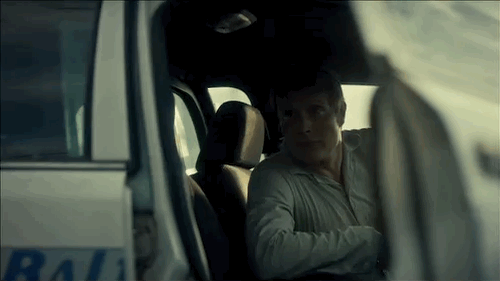
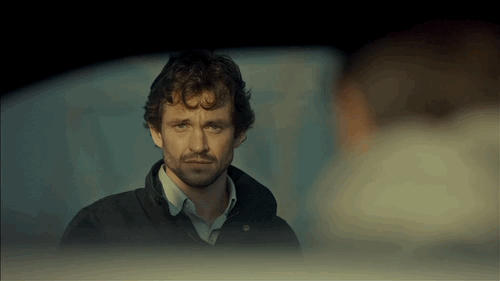
The hour is Bedelia’s post-credits leg writ large, a lingering look at the stumps where whole limbs used to flex and grasp. Frederick, stripped raw by fire and poisoned by self-loathing and bitterness, languishes in a hyperbaric chamber like the one poor Georgia died in back in season 1. Jack sees one final failure open up before him, knowing that perhaps this one will be his last. Alana sees her family, her wife and daughter, for the stolen things they are. “You died in my kitchen, Alana, when you chose to be brave,” Hannibal muses to her through his prison cell’s plexiglass wall. “Every moment since is borrowed. Your wife. Your child. They belong to me. You made a bargain for Will’s life, and then I spun you gold.”
To Will, though, goes the lion’s share of old regrets and newborn doubts. “Does the enemy inside you agree with the accusation?” Hannibal asks him when he bridles at the idea that he pre-planned Chilton’s maiming. He claims, believing the Dragon dead, that his work is done. He says he likes his life with Molly, that he feels nothing more for Hannibal. “You’ll see it’s not the same,” Hannibal gloats. “The unspoken knowledge will live with you like unwanted company in the house.” He might as well hiss, “You’ll never be free of me.” Will knows, though. He has seen in himself that which Hannibal hopes to draw out. He is conscious that whatever his best intentions there will be more Fredericks and Chiyohs in his future.
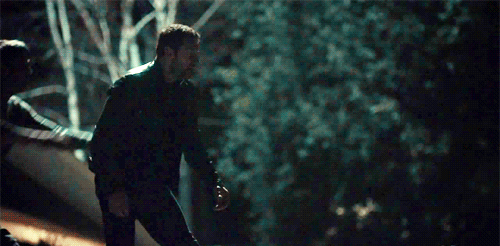
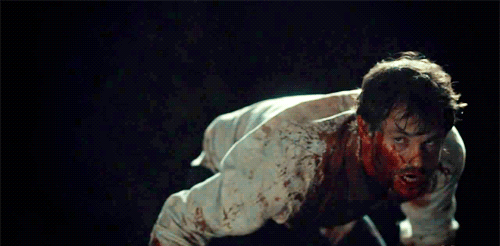
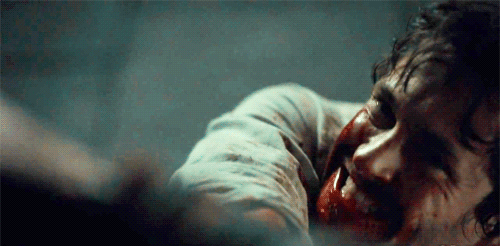
It’s a pity that Hannibal‘s last hour spends so much of its time in mechanical setup. The plot to use Hannibal as bait for Dolarhyde is talked around to the exclusion of meaningful material for the supporting cast, ousting Jack especially from the spotlight and leaving no room for Molly at all. Even the show’s vaunted visuals seem rushed in spots, though the image of Dolarhyde leveling a pistol out the window of a stolen police cruiser will certainly stick in the mind, as will the crumbling cliffs themselves. Hannibal casually kicking dead men out of the car he wants Will to enter is delightfully awful as well, and Hannibal’s fingers snuffing out votive candles may as well be superimposed over the monstrously good final sequence.
Bringing Siouxsie Sioux in to score Hannibal‘s final moments feels like a misstep. The show has never dipped into contemporary music before, and it doesn’t suit its palette. The throaty warbling of Sioux’s ‘Love Crime’ overlays a fight scene without much tension or artistry outside its ghoulish close-ups, bringing Dolarhyde’s circuitous plot to a close without ever really justifying his inclusion outside Armitage’s unquestionably strong performance. “It really does look black in the moonlight,” Will husks, staring at his own blood as Hannibal helps him up. Those last moments are where the episode lives, a tour de force of emotion from its leads culminating in a quiet plunge into the sea below. Love and destruction joined together in Will’s inability to free himself from Hannibal’s influence and his certain knowledge that, left living, he will become what he despises.
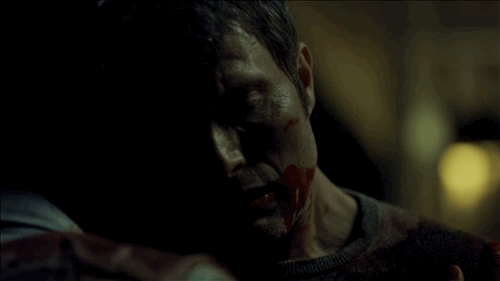
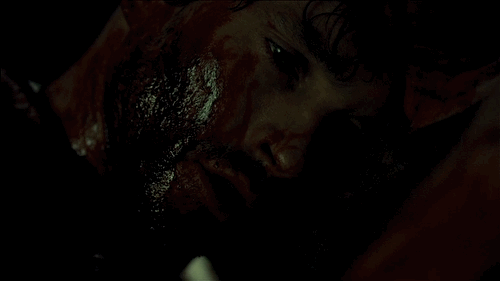
Will and Hannibal cling to one another on the lip of the crumbling bluff, unsubtly positioned as a stand-in for the lies that have sustained and permitted their grotesque relationship. There is a sense that both know what will come, that their long romance/antagonism has prepared them both for the end. Still, when Will propels them over the edge and into the tearing wind the moment takes one’s stomach with it. “This is all I ever wanted for you, Will,” says Hannibal just seconds before it happens. “It’s beautiful,” Will answers.
‘The Wrath of the Lamb’ is not Hannibal‘s best by a long shot. It meanders, it kills time, it ignores its ensemble and shirks its staging and sound design, but there will never be a show that pulls of lighting like this one does during Alana’s conversation with Hannibal. He’s purified by the blue-white godliness of his violence, she’s mired in the dark and tangled skeins of human affection and commitment. Likewise nothing on TV right now or in living memory can approximate the perverse connection between Will and Hannibal, the many facets it enfolds and the ugliness it continually leavens with transcendent beauty. It may not be a perfect ending, nor is the stinger particularly inspired, but it contains within it the seeds of what made this show so irreplaceably special.
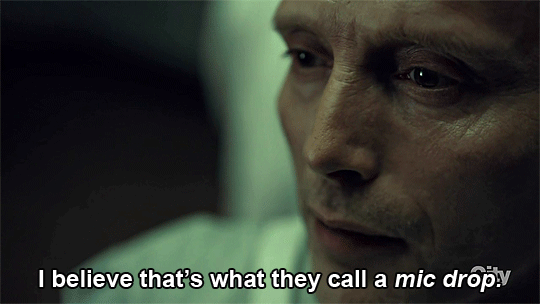
Would that it had been, Hannibal. Au revoir.











































